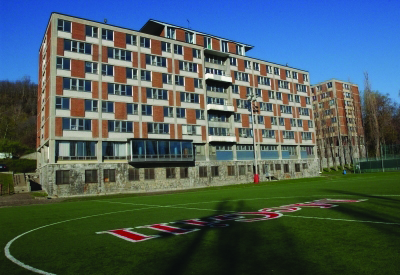McConnell Hall will house students of all genders on every floor starting Fall 2017, joining the other Upper Residences–Gardner Hall and Molson Hall–in featuring mixed-gender floors and washrooms. The shift means that with the exception of the all-women West Wing of Royal Victoria College, every common washroom in McGill residences will now be gender integrated.
The growing demand for mixed-gender accommodations among incoming undergraduates and the rising visibility of transgender issues prompted Residence Life administrators to expand the option in McConnell, where two out of the six floors were mixed-gender previously.
According to Ria Rombough, senior advisor to Residence Life Programs, requests for gender-separated dorms have declined steadily since the 1980s, in part leading to the integration of Molson, and then Gardner.
To gauge the necessity of keeping gender-separated wings in McConnell, Residence Life administrators surveyed students for an internal report in 2016 and found that most residents who selected gender-separated dorms were no longer concerned about living with people of the same gender after their first semester. Students living on mixed-gender floors commented that sharing accommodations with people of different genders was essential to their sense of community. Changing the residence to mixed-gender was the logical response.
“This was the last step in a slow but steady integration process of Upper Residences,” Rombough said.
LGBTQ groups’ demands to improve inclusivity at McGill accelerated the pace of those reforms.
In 2013 the Joint Board Senate Subcommittee on Queer People came to [Rez Life] with a list of recommendations to make the whole package of student residences more accessible in particular to students who are trans and one of those recommendations was to eliminate some gender segregated areas in residence,” Rombough said.
This year, activists have lobbied to secure necessary health services and fought to shut down a trans-phobic talk, heightening the profile of transgender issues on campus.
“I think in the context of those challenges it makes sense that Rez picked up on the importance of gender neutral floors and washrooms,” Mads Motush, a Queer McGill Administrator, La Citadel Floor Fellow, and U3 Arts student, said.
For some students, the decision represents progress on making facilities more inclusive on campus. But others believe that relative to the number of washrooms on campus, McGill still lacks a sufficient number of gender-neutral options.
“It's a natural right for trans people to have a bathroom to use,” Motush said. “There should be at least one all-gender washroom in every building if not every floor.”
The push for inclusivity in McGill’s washrooms should extend beyond providing more mixed-gender options, according to activists such as Lucie Lastinger, a member of the Union for Gender Empowerment and 2017 Arts graduate: Many washrooms don’t have enough space for people using wheelchairs to navigate.
“A next step would be making more bathrooms wheelchair accessible,” Lastinger said. “It's a huge barrier to people.”
Though the proponents of the shift recognized that some students may feel more comfortable in a gender-separated facility, they hope to prompt people to ask why bathrooms are gender-separated in the first place—an issue that affects people irrespective of their gender.
“Sometimes we have this conversation about gender neutral bathrooms as if we are just doing it for trans people,” Lastinger said. “Cis people also use gender neutral bathrooms and those bathrooms could be more accessible to cis people and could be more accessible to trans people. I would encourage people to think more critically about why bathrooms are gender separated in the first place.”









